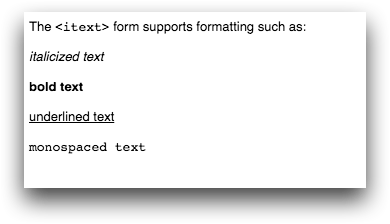<itext>
The <itext> block form expands into an inert <content
type_="itext"> form. It is intended to contain text as well as certain styling
attributes. (Available as of version 11.13)
Description
The explicit intent of this form is to provide a simple way to mark up text for multiple QuickApp targets (e.g., PDF, XLSX) without requiring those targets to parse/understand HTML, CSS, etc.
The <itext> form expands its contents under the ordinary block code
rules, but with the option of further marking the { and }
scalar context delimiters for a scalar expression so
that text contents of the form that contain these delimiters as literal text need not be
specially marked up.
If any of the contents expands into XML, the XML is converted into text.
The styling attributes currently recognized by the <itext> form
are:
[i](italicize)[b](bold)[u](underline)[t](monospaced font)
Each is terminated, as in HTML, with a "close" tag (e.g., [/i]).
Syntax
<itext s_="[SHIFT_MARKER]"
si_="[SHIFT_IN_MARKER]"
so_="[SHIFT_OUT_MARKER]"
e_="[PREFIX_STRING]">
[TEXT_CONTENTS]
</itext>
Attributes
s_- Specifies a "shift" marker which must precede
{and follow}for those to be considered scalar context delimiters.For example,
s_="~~"would require~~{and}~~as delimiters for a scalar expression.Separate "shift in" and "shift out" markers may be specified via the
si_andso_attributes, respectively. si_- Specifies a "shift in" marker which must precede
{for it to be considered a scalar context delimiter.For example,
si_="[[" so_="]]"would require scalar expressions to be delimited with[[{and}]]. so_- Specifies a "shift out" marker which must follow
}for it to be considered a scalar context delimiter.For example,
si_="*" so_="!"would require scalar expressions to be delimited with*{and}!. e_- Specifies a string that must precede both
{and}for those to be considered scalar context delimiters.For example,
e_="."would require.{and.}as delimiters for a scalar expression.
Example
The following example demonstrates how the <itext> form can be used to
format text using the available styling attributes.
<dynamic> <widget class_="text"> <itext> The [t]<itext>[/t] form supports formatting such as: [i]italicized text[/i] [b]bold text[/b] [u]underlined text[/u] [t]monospaced text[/t] </itext> </widget> </dynamic>

